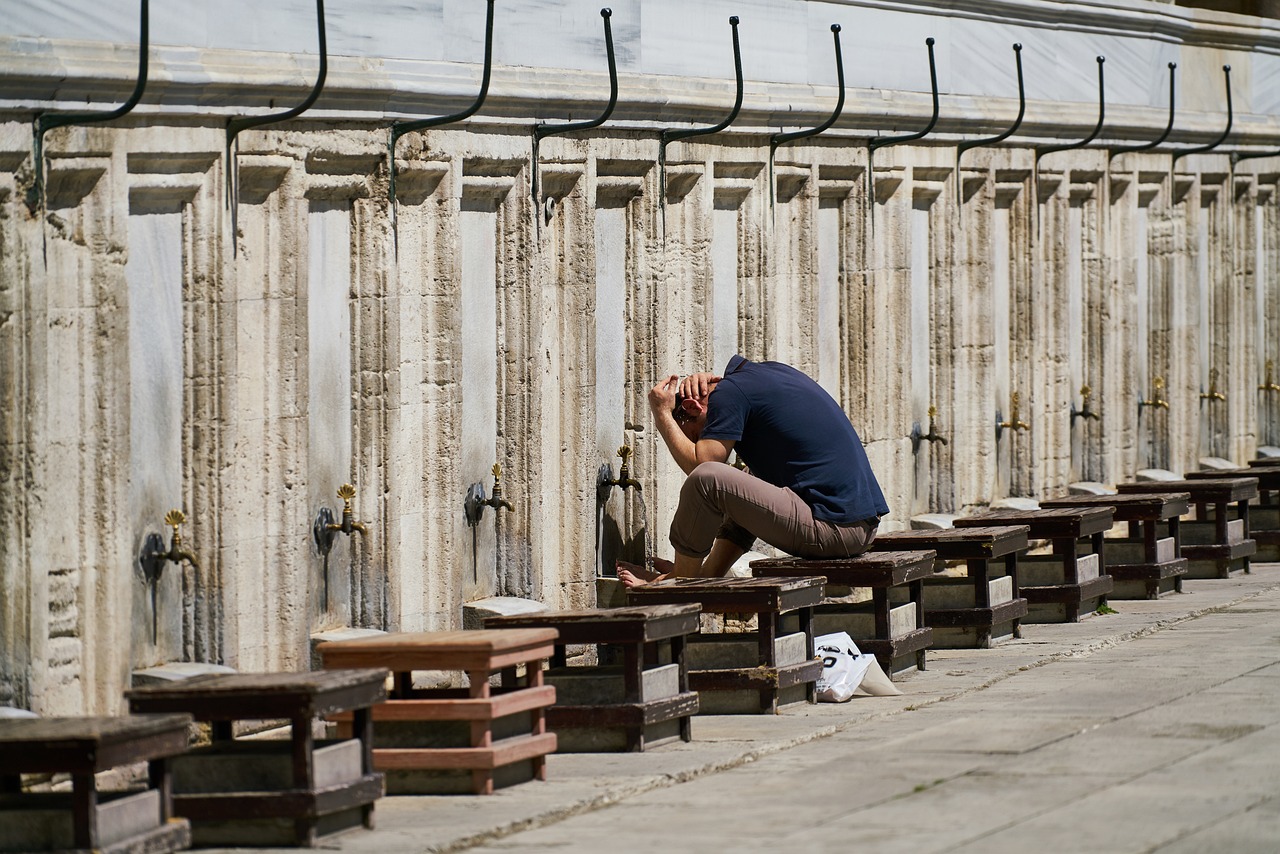Wudu is the ritual of cleansing and purifying oneself before praying or touching any holy book like the Quran. Just like certain things invalidate a Muslim’s salah, fast, etc, some things invalidate or break a person’s wudu. This blog will discuss these things in detail.
Natural Bodily Discharge
Bodily discharges such as urine, feces, and passing wind all break a person’s wudu, and the renewal of wudu is required whenever one experiences any of the above. These are considered impurities in Islam and can act as barriers during one’s prayers.
O ye who believe! When you rise up for prayer, wash your faces and your hands up to the elbows, and lightly rub your heads and (wash) your feet up to the ankles. And if you are unclean, purify yourselves. [Surah Maida, Verse 6]
Touching One’s Private Parts
If one directly touches their private parts without any barrier, that invalidates the wudu, and this view is based on several hadiths.
Busrah reported that the Prophet Muhammad said: “If anyone touches their private part, they should renew their ablution.” [ Sunan an-Nasa’i 444]
Fainting
The scholars agree that if a person faints, no matter for how long, he should renew his ablution. There isn’t a specific hadith about fainting invalidating the wudu. Still, this opinion is based on the fact that the person who faints won’t be aware of his body, and if any bodily liquids come out of the body, the individual will be unaware.
Eating Camel Meat
Backed up by several hadiths, camel meat stands as a factor that can invalidate one’s wudu. The reason for this is that certain properties in camel meat affect a person’s state of purity.
A man asked the Prophet PBUH if he should perform ablution when he had eaten camel meat. The Prophet PBUH replied in affirmative and said that he should perform ablution after he has consumed camel flesh. [Sahih Muslim 360a]
Vomiting
Vomiting a mouthful or more than that is also classified as an event that requires the renewal of wudu. But the volume of the vomit plays a role. This is based on the fact that when a person vomits, he is ejecting impurities out of his mouth.
Also, scholars differ on this issue. Imam Abu Hanifah and Imam Ahmed say that vomiting does invalidate wudu, but Ahmed stipulated that wudu is broken if there is a large amount of vomit.
On the other hand, Imam al Shafi’s view is that vomiting does not invalidate the wudu. In the end, it really depends on the fiqh a person follows.
Sleeping
There is a difference of opinion among scholars regarding the fact that sleep breaks wudu.
- The first opinion is that all kinds of sleep break wudu, whether it is light sleep or deep sleep, and it doesn’t matter which position the person has slept in. This opinion is based on the following hadith: Safwan bin Assal narrated that when they were traveling, the Prophet (ﷺ) instructed them not to remove their leather socks (Khuff) for three days and nights, except in the case of major impurity (Janabah), not for defecating, urinating, or sleeping. [Jami` at-Tirmidhi 96]
- The second opinion is that sleep doesn’t invalidate Wudu in all cases. This opinion is based on the following hadith: Anas reported that when the people stood for the night prayer, a man stepped forward to speak. The Prophet PBUH had a private conversation with him, and during this time, some of the people began to doze off. Then, they prayed after the conversation ended. [Sahih Muslim 376d] According to the report of Al-Bazzar, the Sahaba would lie on their sides.
Both of these opinions are based on evidence. However, most scholars agree that sleep can break wudu (ablution) in some situations but not in others. However, they have different opinions on how to understand and apply the evidence related to this issue.
- According to the Hanafis and Shafi’is, if a person sleeps while sitting with their backside firmly on the ground, their wudu remains valid. However, if their backside is not firmly on the ground, wudu is invalidated, no matter what position they are in.
- The Hanbalis believe that sleep breaks wudu, except for light sleep, when a person is sitting or standing.
- Some scholars, including Malik and as reported in one narration from Ahmad, hold the view that a significant amount of sleep invalidates wudu regardless of the situation, unlike a small amount of sleep, which does not.
Blood Loss
According to the consensus of the scholars, bleeding from any natural orifice, such as the anus, vagina, or urethra, breaks the wudu. On the other hand, blood from a wound or cut doesn’t break the wudu unless the blood is so much that it flows over.
When In Doubt
If a person is in doubt and doesn’t know for sure if their wudu is broken, the recommendation is to think that it is still intact.


Jazakallah For Sharing.